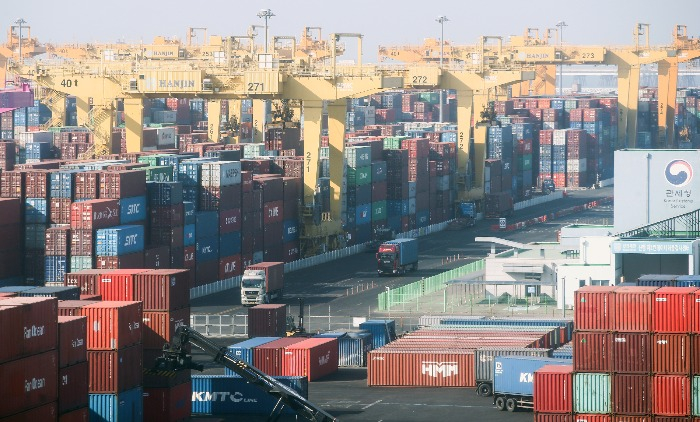Economy
Korea returns to current account surplus in Dec but faces export slump
The country posted a current account surplus of $29.8 billion for 2022, off 65% from 2021 on weak exports
By Feb 08, 2023 (Gmt+09:00)
1
Min read
Most Read
Alibaba eyes 1st investment in Korean e-commerce platform


Blackstone signs over $1 bn deal with MBK for 1st exit in Korea


NPS loses $1.2 bn in local stocks in Q1 on weak battery shares


OCI to invest up to $1.5 bn in MalaysiaŌĆÖs polysilicon plant


Korea's Lotte Insurance put on market for around $1.5 bn



South KoreaŌĆÖs current account balance returned to the black in December from the previous month mainly thanks to gains in dividend payments but still more than halved its on-year showing due to sluggish exports from the global economic downturn, raising concerns about the export-reliant countryŌĆÖs economy.
The country posted a surplus of $2.7 billion in December's current account, swinging from a $220 million deficit the month previous but 57.9% lower than December 2021, according to data from the Bank of Korea on Wednesday.
For the whole of 2022, the countryŌĆÖs current account surplus amounted to $29.8 billion, sharply down from $85.2 billion in 2021. The BOK projected a $25 billion surplus for last year.
The plunge in current account surplus was largely blamed on sluggish exports, the main driver of KoreaŌĆÖs economic growth.
Exports dropped 10.4% on-year to $55.6 billion in December, extending their losing streak for the fourth month in a row. The countryŌĆÖs outbound shipments dipped into the red in September for the first time in 23 months due to a slowdown in semiconductor exports. Imports fell 2.7% to $56.1 billion.
With the weak exports, KoreaŌĆÖs goods account balance posted a deficit of $480 million in December, the third consecutive loss since October. In the same month a year earlier, Korea reported a surplus of $4.4 billion.
The service account also widened its deficit to $1.4 billion in December from $760 million a year ago mainly due to a fall in revenue from the transport sector and a rise in outbound travel following border reopenings around the world. The deficit also grew to $5.6 billion in 2022 from $5.3 billion in 2021.
The country returned to a current account surplus from the previous month thanks to a rise in primary income account surplus to $4.8 billion in December from $3.5 billion a year ago, mainly driven by income gains from investments, especially dividend payments from overseas subsidies of Korean companies.
The central bank expects the countryŌĆÖs current account will be swayed by energy imports, global economic conditions and a recovery in the IT sector despite lingering economic uncertainties.
Write to Do-won Lim at van7691@hankyung.com
Sookyung Seo edited this article.
More to Read
-
 EconomyS.Korea posts 2nd current account deficit in 3 months due to flat exports
EconomyS.Korea posts 2nd current account deficit in 3 months due to flat exportsJan 11, 2023 (Gmt+09:00)
1 Min read -
 EconomyKorea October current account surplus tumbles as exports slide
EconomyKorea October current account surplus tumbles as exports slideDec 09, 2022 (Gmt+09:00)
2 Min read -
 EconomyFalling Korea current account surplus heightens economic woes
EconomyFalling Korea current account surplus heightens economic woesNov 08, 2022 (Gmt+09:00)
1 Min read
Comment 0
LOG IN


